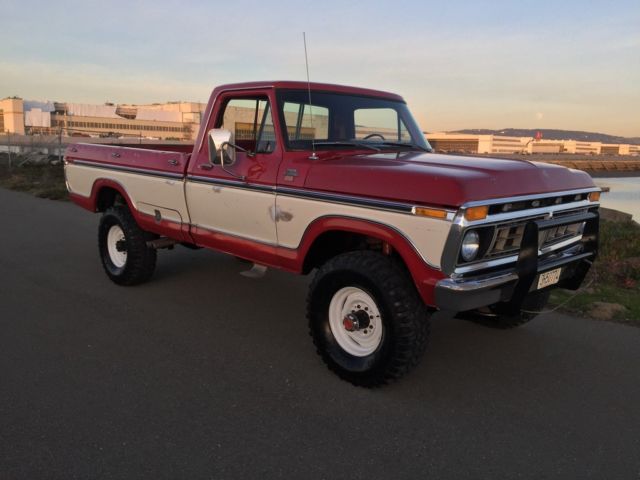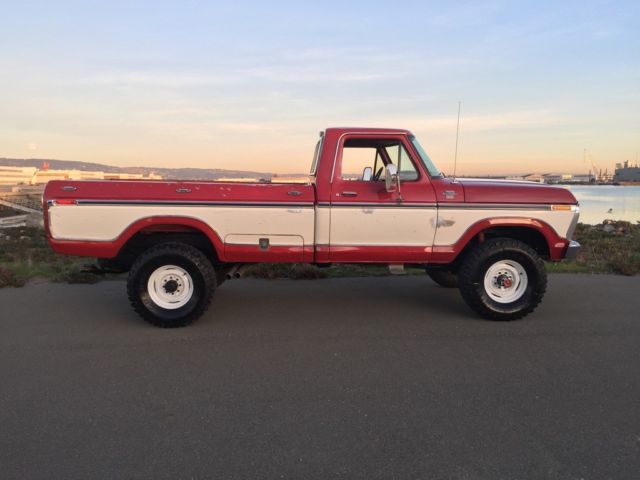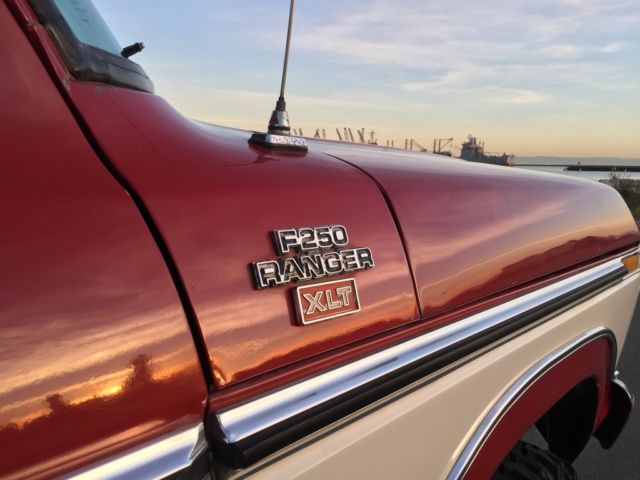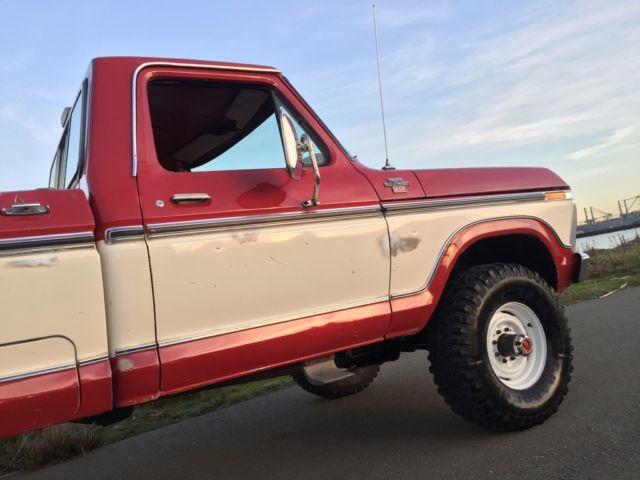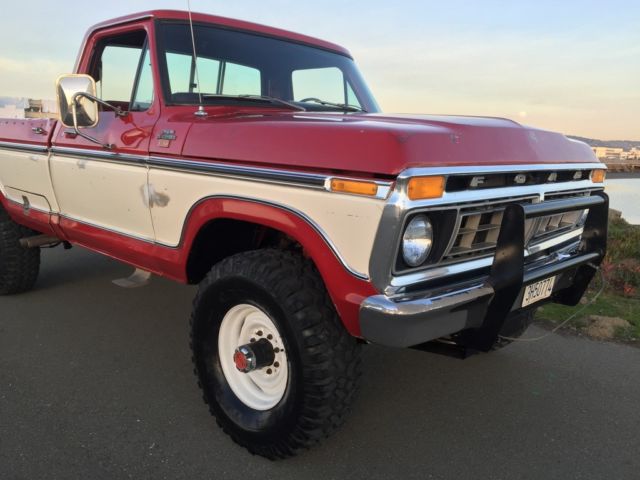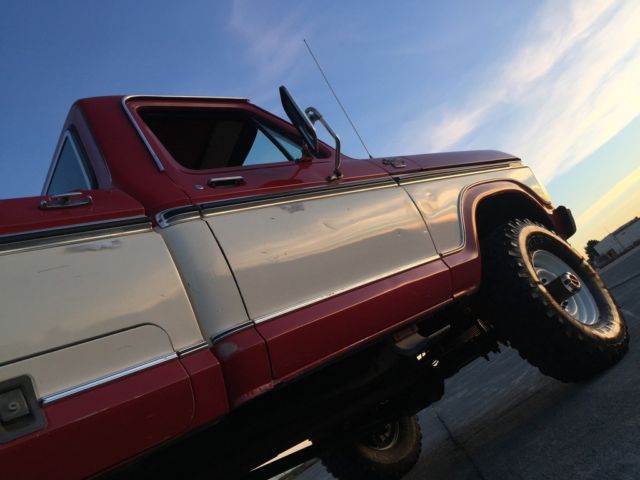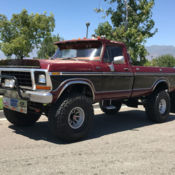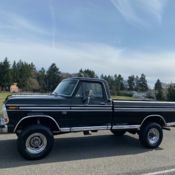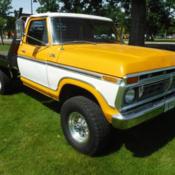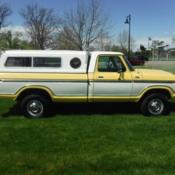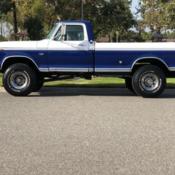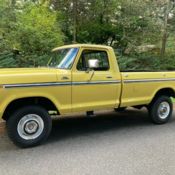1977 Ford F-250 Ranger XLT 4x4 Original California rust free Highboy No Reserve
| Condition: | Used |
| Make: | Ford |
| Model: | F-250 |
| Type: | Standard Cab Pickup |
| Trim: | Ranger XLT |
| Year: | 1977 |
| Mileage: | 29,000 |
| VIN: | f26HC080782 |
| Color: | Red |
| Engine: | 351 |
| Cylinders: | 8 |
| Fuel: | Gasoline |
| Transmission: | Automatic |
| Drive type: | 4WD |
| Interior color: | Red |
| Vehicle Title: | Clear |
| Item location: | Moraga, California, United States |
| Extras |
|
Air Conditioning, Cruise Control 4-Wheel Drive, Cassette Player |
| Listed by | Private seller |
Description of 1977 Ford F-250 Ranger XLT |
|
1977 Ford F-250 Ranger XLT 4x4~Last of the divorced Np205 transfer case "highboys"~Open knuckle low pinion Dana 44 front axle~Full floating low pinion Dana 60 rear axle~Candy Apple Red with WimbledonWhite~Top of the line Ranger XLT package~Front Disc Brakes~One of the LAST high boys built, LAST of an era~ Up for a NO RESERVE auctionis a beautiful Candy applered and Wimbledonwhite 1977 Ford F-250 4x4. This heavy duty rig has spent its life in the mild climate of the San Francisco bay area. This truck was ordered new 40 years ago with virtually no options spared. It had been passed down within the same family before ultimately being relegated to a POD container 12 years ago. For 10 years it sat inside a container untouched by the elements. It was ultimately decided the truck had no more use to the family and is now availableto own. The truck was built in Ontario, Canada destined for the USA. It has been in California since 1977 and is an honest rust free solid truck still retaining all its original body panels and moldings. 1973-1979 Ford F series trucks have been all the craze lately. When full size trucks dominate the market today there is a nostalgic desire to to look back and appreciate the the trucks of the past as they were the foundation to what we have and enjoy today. The desirability for these classic american vehicles has spiked as they are becomingharder and harder to find in good condition, because after all they were designed and used to be heavy duty working vehicles and take the beating that entails. The most desirableof this segment is the 3/4 ton 4 wheel drive variants. The 73-77.5 4x4 models are the most sought after because of their unique design and higher stance giving them the popular nickname "high boys". The divorced transfer case 3 shaft design was attributed to Fords holdout to the married transfer case design that other manufactures went with in the 60s. Highboys have other unique attributes that are only found on them; these include the obvious high stance due to the 3rd shaft connecting the transfer case to the transmission, the also have a narrower 33.5 inch frame, only 1 gas cab mounted gas tank, only came with 360 v8s except for early 1977, only had drum brakes except 76 and 77 models with disc in the front, they only were F-250s, vin starting with F26. Other attributes include a full floating low pinion Dana 60 rear axle with a low pinion Dana 44 front axle with either a closed knuckle or a open knuckle design for 76-77 only. The trucks were known for their rugged dependability to get the job done and look good while doing it.F26 trucks were improved upon year after year making the later models the most advanced examples of Highboy trucks. What makes this specific Red and White truck so special is the fact it is one of the last highboys made marking it the last of a generation in 4x4 truck design. 1977 was a changeover year from the high boy design to the married transfer case "Lowboy" design. 1977 F26 models were produced in late 1976 as high boys, Ford closed down production of 4x4 F-250s over the holidays to change over and gear up production of the 1977 Lowboys in early 1977. Being this truck was built in November of 1976 makes it a rarity as one of the few 77 high boys built in the changeover year. This 1977 model is trulythe best of what a Ford highboy is. Starting with the drive trainthe 351M is a more refined motor than what it replaced and only in 1977 was it possible to order a F250 4x4 with a 351M. The Dana 44 open knuckle front axles are the most preferredamong F26 trucks, also introduced in 76 disc brakes for the front was an option that improvedthese trucks. This 77 model isn't just mechanically the most desirable it comes heavily optioned and is the right colors. This isn't just another single color F250 Custom cab, this baby comes equippedas the top of the line Ranger XLT model in a two tone Candyapple Red and WimbledonWhite paint job. In the earlier years 4x4 trucks were not as popular as they are today and people only bought because they needed them, most were used as work trucks in harsh climates. Therefore many of them are no longer around or in poor condition. This is not one of those trucks this was purchased as a personal rig and treated with care. It is no secret 4x4 Ford trucks are a hot buy in todays market, these trucks have exceeded $50k at collector car sales. Experts and publicationsalike say the classic 4x4 truck market is the next big thing as values are and will continue to rise and Ford trucks are leading the way. What better time is it than now to get into the classic truck market with this opportunity to own one the last and best equipped Ford F250 highboys. F26= Ford F-250 4x4H= 351M motor for 1977C=Built in Ontario, CanadaTM=Candyapple Red and Wimbeldon WhiteLD=Ranger XLT with Red Vinyl Cosmetically this truck is in solid shape for a 40 year old truck. All the panels are original American steel with no rust holes or bubbling. The red and white paint looks beautiful and is a fantastic combo for this truck. There are imperfections and it isn't perfect. There are small dings here and there the most significant is the drivers fender. The underneath is very solid with no rust holes or bubbling. Many sections of red paint are visible underneath. The frame and axles have been coated in Por 15 to touch up the look and preserve the metal. Cosmetically overall this truck is in good condition, it is a 40 year old truck that has not been restored and has some imperfections. But considering these trucks usually are all beat to nothing or rusted out this is a very nice example of what a 40 year old truck maintained in a mild climate looks like. Mechanically this truck is in very good shape. Being a 77 model it is equipped with the best Ford had to offer. To be honest these old 4x4 trucks can be a handful to drive. This is by far one of the best 40 year old 4x4 trucks I've driven. It has been maintained and taken care of all its life which can be appreciated when driving it.The 351M motor has been rebuilt and runs fantastic. The transmission shifts smooth and the power steering steers with ease (a luxury with old 4x4s). Every light works including interior and under the hood. All the gauges work, radio, fans. The factory AC compressor had been removed, so the AC is not operating however I do have the original compressor. The only negative would be a slight exhaust leak but overall make no mistake this truck is in great operating order. It does have a Sidewinder winch as well as its control remote. Interior wise this truck is in great condition. The carpet was replaced with a brand new one. As well as the seat had been reupholstered however the old upholstery isn't in bad shape and I still have it. The original Ranger XLT dash wood looks great as well as the original headliner and door panels. The original dash has ZERO cracks and looks great. The original build sheet from 1976 was able to be recovered from the back of the seat and shows every detail as ordered. ~I have described this truck the best I can I have included over 100 photos and Video of this truck. Please rememberthis is a 40 year old truck. Please ask me any questions or concerns I will answer ASAP. Thanks and Good Luck~ Additional information on 1973-77.5 Ford F-250 Highboys Highboy, High Boy, Hiboy, Hi-Boy, and HB are slang terms used byenthusiasts, and are not official or correct Ford terminology. If your goal is to use correct Ford terminology, then Ford referred to the 1967-1977.5 F-250 4x4 as a "Factory High Rider" in print advertising (the advertisement was in 1969). Additional terms that are not correct Ford terminology, but are used by enthusiasts, are 1977.5 to denote the mid-year end of the Highboy, bumpside refers to the fifth generation (1967-1972) F-series, and dentside refers to the sixth generation (1973-1979) F-series pickup trucks. The enthusiast terms are used here. This is a compilation of information relating to the Highboy, the 1967-1977.5 F-250 4x4, and is intended to inform people who are interested in Highboy trucks. This information will be continuously edited and updated. My apologies for any errors. Corrections will be updated after verification (if possible) or general consensus. Sections below include: Highboy Derivations Highboy Definition Highboy Axles Highboy Body Highboy Brakes Highboy Cabs Highboy Engines Highboy Frames Highboy Gas Tanks Highboy Model Year Summary Highboy Significance Highboy Steering Highboy Suspension Highboy Tires and Wheels Highboy Transfer Cases Highboy Transmissions Highboy VIN Highboy Wheelbase Lowboy Monster Trucks To Do ################################################## ######################### # Highboy Derivations # ################################################## ######################### Derivations of the term Highboy 1. Highboy is an old hot-rodder's term for a 1928-1932 Ford roadster with the fenders, running boards, and splash shields removed, which exposes the body sitting atop the frame rails, hence: Highboy. 2. The hot-rodder probably borrowed the term from highboy furniture, which is a tall chest of drawers divided into two sections and supported on four legs. Highboy furniture was produced in the late 18th and early 19th centuries. 3. A Hiboy is a specialized, high-clearance type of farm tractor designed to operate in high crops without damaging them. The largest producer of Hiboys is Hagie Manufacturing Company of Clarion, Iowa, United States. The most common uses of Hiboys are for detasseling, spraying herbicides, and applying Roundup directly to weeds growing above crop height with a wick or wiper. 4. Vintage 1978-1980 (best guess) JC Whitney parts catalogs allegedly used the terms hi-boy and low-boy to differentiate between 1973-1977.5 F-250 4x4's and 1977.5-1979 F-250 4x4's, regarding parts. ################################################## ######################### # Highboy Definition # ################################################## ######################### Highboy: 1967-1977.5 Ford F-250 4x4 Regular Cab or Crew Cab light-duty pickup truck with a divorced transfer case and narrow frame. The Highboy got its name from sitting higher from the factory than other Ford pick-up trucks. The divorced transfer case (Dana 24, NP203, or NP205) caused the front-end to be higher, so the rear-end had 4-inch lift blocks to bring the rear-end up to the same height. Once Ford switched to married transfer cases in mid-1977, people started referring to the 1973-1977.5 divorced transfer case trucks as Highboys and the 1977.5-1979 married transfer case trucks as Lowboys. The previous generation, 1967-1972, was essentially the same, and has been included in most definitions of Highboy as well. ################################################## ######################### # Highboy Axles # ################################################## ######################### Front axles were an 8-lug low-pinion Dana 44 (1967-1977.5), 8-lug low-pinion Dana 44HD (1969-1975), or 8-lug low-pinion Dana 60 (1973-1975, Crew Cab Highboys only). There were no high-pinion front axles in Highboys, although high-pinion front axles are preferable to low-pinion front axles. The Highboy front axles were a closed-knuckle design from 1967-1975, and open-knuckle design in 1976-1977.5. The open-knuckle design is preferable. Many Highboy owners replace their low-pinion front axles with a high pinion 1977.5-1979 Dana 44, or better yet, the 1979 high-pinion HD Dana 60 with 35-spline inner shafts and 30-spline outer shafts. Rear axles were an 8-lug full-floating Dana 60 with 16 splines (1967-1975) or 30 splines (1967-1977.5), but both were the same 1-5/16" diameter. It is common for those with the 16-spline Dana 60's to replace them with a Dana 70, GM 10.5" 14-bolt, or other rear-end. In 1976, HD external hubs became standard. All Highboys had 4.10:1 gear ratios. ################################################## ######################### # Highboy Body # ################################################## ######################### The body sheetmetal became thinner in 1973, when the F-series began its sixth generation (1973-1979). The fifth generation (1967-1972) became known as bumpsides, and the sixth generation became known as dentsides. Even though the sheetmetal is thinner on a dentside, Ford put a corrosion- resistant coating on it and used more galvanized metal. Bumpsides typically have rusted-out inner fenders and core supports, compared to dentsides. ################################################## ######################### # Highboy Brakes # ################################################## ######################### Highboys had drum brakes on all wheels (1967-1975), or a combination of front disc brakes and rear drum brakes (1976-1977.5). Highboys had either manual brakes (1967-1977.5) or optional power brakes (1973-1977.5). ################################################## ######################### # Highboy Cabs # ################################################## ######################### All Highboys were Regular Cab or Crew Cab. There were no F-250 4x4 SuperCabs until 1978, possibly because SuperCabs don't bolt to the narrow frame. Because of the narrow frame rails, a Highboy's rear cab mounts are outside of the frame rails. ################################################## ######################### # Highboy Engines # ################################################## ######################### Here is a list of Highboy engines by year (1V indicates 1-barrel carb.): 1967: 240 1V Six, 300 1V Six, 352 2V V-8 1968-1972: 240 1V Six, 300 1V Six, 360 2V V-8 1973-1976: 300 1V Six, 360 2V V-8 1977: 300 1V Six, 351M 2V V-8, 400 2V V-8 Here is a list of Highboy engines: 240 1V Six (1967-1974) 300 1V Six (1967-1977.5) 351M 2V V-8 (1977) 352 2V V-8 (1967) 360 2V V-8 (1968-1976) 400 2V V-8 (1977) Two modifications are common. First, the 360 is identical to the 390, with the exception of the rotating assembly. Although 390's were never offered in Highboys, many owners with 360's replace the rotating assembly, converting to a 390, or sometimes to a 410. The other common modification is to replace the factory engine with a 460, which was never offered in Highboys. ################################################## ######################### # Highboy Frames # ################################################## ######################### Highboys have a unique frame, not shared with other trucks. Like the F-350 frame, all Highboys have a narrow frame, which is 33.5-inches wide. Fifth generation (1967-1972) F-series trucks had narrow frames as well. Sixth generation (1973-1979) F-series trucks had wider 37.5-inch rear frame rails, except for the 1973-1977.5 Highboy frame and the 1973-1979 F-350 with 139-inch wheelbase. This frame rail width is measured directly behind the rear bumper, from outside of rail to outside of rail. The F-350 frame was narrowed for duallies. The Highboy frame does not bend to the left or right (unlike the other F-100, F-150, or F-250 frames), though it does bend up and down to accommodate the cab. A front crossmember, positioned just below the front bumper and visible while standing in front of the truck, separates the Highboy frame from the bumpside F-350 frame. No other truck had this crossmember. Since Highboys have a frame that is different from other F-series trucks, Highboys require different beds than other F-series. The Highboy frame was never used on another truck. Ford frames have a stamped ID number on the right frame rail-outer-front, near the engine crossmember. The first digit is decade, where C=1960's and D=1970's. The second digit is the year. The third digit is T for Truck. The fourth digit is Z, indicating a Ford part. For example, C7TZ indicates a 1967 truck part. Note: Ford updates part numbers, which is why the 131" wheelbase 1973-75's have a 1976 part number, and the 1976 150" wheelbase has a 1977 part number. The following are listed below: Frame ID, height in inches of frame rail just behind the cab, width of frame rail, thickness of rail, SM is section modulus (one component of frame strength), WB is wheelbase, years produced, model, and cab type (where CC is Crew Cab, RC is Regular Cab, and SC is SuperCab): ### Highboy Frames Frame I, Height, Width, Thick, SM, WB, Years, Model, Cab C7TZ-5005-EF, 7 01/16, 3 00/00, 13/64, 5.58, 131, 67-72, F-250 4x4, RC D4TZ-5005-, 7 01/16, 3 00/00, 01/04, 6.23, 150, 73-75, F-250 4x4, CC D6TZ-5005-, 7 00/00, 3 00/00, 13/64, 5.58, 133, 73-77, F-250 4x4, RC D6TZ-5005-, 7 01/16, 3 00/00, 01/04, 6.23, 150, 76-76, F-250 4x4, CC D7TZ-5005-, 7 01/16, 3 00/00, 01/04, 6.23, 150, 77-77, F-250 4x4, CC ### Lowboy Frames D6TZ-5005-V*, 6 07/08, 2 13/32, 03/16, 4.33, 133, 77-77, F-250 4x4, RC D7TZ-5005-W*, 7 01/04, 2 01/02, 01/04, 5.67, 150, 77-78, F-250 4x4, CC D9TZ-5005-, 7 01/04, 2 01/02, 01/04, 5.67, 150, 79-79, F-250 4x4, CC D9TZ-5005-, 6 07/08, 2 13/32, 03/16, 4.33, 133, 78-79, F-250 4x4, RC D9TZ-5005-, 8 01/32, 2 01/02, 01/04, 6.67, 155, 78-79, F-250 4x4, SC ### Non-Highboy Frames (Sample) D3TZ-5005-, 8 00/00, 3 00/00, 01/04, 7.84, 160, 73-75, F-350 4x2, CC D3TZ-5005-, 6 03/04, 2 07/16, 03/16, 4.14, 133, 73-73, F-100 4x4, RC D4TZ-5005-, 6 21/32, 2 03/08, 05/32, 3.26, 133, 73-74, F-100 4x2, RC D4TZ-5005-, 7 01/16, 3 00/00, 01/04, 6.23, 150, 73-75, F-250 4x2, CC D4TZ-5005-, 7 01/32, 2 03/04, 07/32, 5.53, 138, 73-75, F-250 4x2, SC D6TZ-5005-, 8 01/32, 2 01/02, 07/32, 4.43, 138, 76-76, F-250 4x2, SC D6TZ-5005-, 6 21/32, 2 03/08, 09/64, 3.08, 116, 73-75, F-100 4x2, RC D6TZ-5005-, 7 00/00, 3 00/00, 13/64, 5.58, 136, 73-76, F-350 4x2, RC D6TZ-5005-, 8 01/32, 2 01/02, 07/32, 5.95, 155, 73-76, F-250 4x2, SC D6TZ-5005-, 7 01/16, 3 00/00, 01/04, 6.23, 150, 76-76, F-250 4x2, CC D7TZ-5005-, 6 07/08, 2 13/32, 03/16, 4.33, 133, 73-77, F-250 4x2, RC D7TZ-5005-, 6 07/08, 2 13/32, 03/16, 4.33, 138, 77-77, F-250 4x2, SC D7TZ-5005-, 7 01/32, 2 03/04, 07/32, 5.53, 155, 77-77, F-250 4x2, SC D7TZ-5005-, 7 01/16, 3 00/00, 01/04, 6.23, 150, 77-78, F-250 4x2, CC D8TZ-5005-, 8 01/32, 2 01/02, 01/04, 6.67, 155, 77-77, F-250 4x2, SC D8TZ-5005-, 6 07/08, 2 13/32, 03/16, 4.33, 133, 78-78, F-250 4x2, RC D8TZ-5005-, 6 07/08, 2 13/32, 03/16, 4.33, 138, 78-78, F-250 4x2, SC D8TZ-5005-, 8 01/32, 2 01/02, 01/04, 6.67, 155, 78-78, F-250 4x2, SC D8TZ-5005-, 7 01/32, 2 03/04, 07/32, 5.53, 155, 78-78, F-250 4x2, SC D8TZ-5005-, 6 03/04, 2 27/64, 03/16, 3.91, 116, 73-76, F-100 4x4, RC D8TZ-5005-, 6 03/04, 2 27/64, 03/16, 3.91, 116, 77-77, F-150 4x4, RC D8TZ-5005-, 6 03/04, 2 07/16, 03/16, 3.95, 116, 78-78, F-150 4x4, RC D9TZ-5005-, 7 01/16, 3 00/00, 01/04, 6.23, 150, 79-79, F-250 4x2, CC D9TZ-5005-, 8 01/32, 2 01/02, 07/32, 4.43, 138, 79-79, F-250 4x2, SC D9TZ-5005-, 7 01/32, 2 03/04, 07/32, 5.53, 155, 79-79, F-250 4x2, SC D9TZ-5005-, 8 01/32, 2 01/02, 07/32, 5.95, 155, 79-79, F-250 4x2, SC D9TZ-5005-, 6 07/08, 2 13/32, 03/16, 4.33, 133, 79-79, F-250 4x2, RC *The information on these frames differs from that of the source, because it is strongly suspected that the source was incorrect, suggesting these Lowboy frames were identical to the Highboy frames. The dimensions and section modulus has been changed to that of the later Lowboy. 1973-1979 Ford frame information above was obtained from the following publication: Ford 1973/79 Truck Series 100-500 Master Parts and Accessories Catalog, Section 50, p.2-4. Numerous other non-Highboy frame dimensions were not included. The Highboy Regular Cab frame is the strongest for its wheelbase, tying with some F-350's at SM=5.58, though it breaks the tie because it has an additional crossmember that is not taken into account, as it shouldn't be, when calculating section modulus. The Highboy Regular Cab frame is 28.8% stronger than the Lowboy Regular Cab frame, and the Highboy Crew Cab frame is 9.8% stronger than the Lowboy Crew Cab frame. The Lowboy SuperCab is the strongest F-250 frame, and the F-350 Crew Cab has the strongest frame. ### Chrysler/GM Comparisons 1975 Dodge W200, 131 WB, 3.88 SM 1979 Chevrolet K20, 3.92 SM There are no 1973-1979 Ford F-250 frames, whether 4x2 or 4x4, that are as weak as the 1975 Dodge W200 131-inch wheelbase, or the 1979 Chevrolet K20. ################################################## ######################### # Highboy Gas Tanks # ################################################## ######################### Highboys came only with in-cab gas tanks, and optionally, with an additional side-mounted gas tank, but never with a rear gas tank. A rear gas tank is too wide to fit between the narrower 33.5-inch-wide rear frame rails of the unique Highboy frame, and can only fit between the 37.5-inch-wide non-Highboy rear frame rails. All F-series light-duty pickup trucks during 1956-1972 had in-cab gas tanks. In 1973, Ford moved the gas tank to the rear under the bed, except for Highboys. 1977 was the last year for the in-cab gas tank, because US vehicle safety standards outlawed it. Make sure the filler neck grommet remains completely sealed against the cab, and occupants will not smell gas fumes. If both the cab and gas tank are breached in a serious collision, the occupants probably will not be alive to worry about the potential fire. In this respect, the gas tank is safer in the cab, since it is less likely to be breached in the cab than under the bed, especially while off-roading. ################################################## ######################### # Highboy Model Year Summary # ################################################## ######################### Highboys were manufactured from 1967-1977.5 (assembled before serial number Y20,001). The last Highboy was produced in February, 1977. Below is a summary of changes to Highboys by model year: 1967 The fifth generation F-series begins, and the Highboy is born. This is the only year for the 352 2V V-8. 1968 The 360 2V V-8 replaces the 352 2V V-8 as the optional V-8. Regarding seat belts, shoulder harnesses became an option. 1969 The low-pinion Dana 44 HD front axle was introduced. 1970 1971 This is the last year for the Ford Toploader 3-speed manual transmission in the Highboy. 1972 This is the last year for the fifth generation F-series, and the 240 1V Six (though it continued in other F-series trucks through 1974). The NP-435 4-speed manual transmission became the standard transmission, and for this year only, the only transmission. 1973 The sixth generation F-series begins. Body sheetmetal becomes thinner, the wheelbase changes, and the Highboy acquired the following new options: SelectShift Cruise-O-Matic automatic transmission, power ram assist steering, and power brakes. This is the last year for the Dana 24 transfer case, and simultaneously, the first year for the (standard) NP205 part-time and (optional) NP203 full-time divorced transfer cases. The 300 1V Six replaces the 240 1V Six as the standard engine. 1974 1975 This is the last year for the low-pinion Dana 44 HD front axle, front drum brakes, and closed knuckle axles. 1976 This is the last year for the optional 360 2V V-8. The Highboy gets front disc brakes, open-knuckle axles, and standard HD external hubs. Many assert that 1976 is the best year for a stock Highboy, because of disc brakes, open-knuckles, HD hubs, and the FE engine. 1977 The 351M 2V V-8 and 400 2V V-8 engines replace the 360 2V V-8 as optional V-8's. Highboy production ceased in February 1977, before serial number Y20,001. Many assert that 1977 is the best year for a Highboy if the intentions are to swap in a 460, because it has all the benefits of the 1976 year, and the 460 is easy to swap in as a replacement for the 351M or 400. ################################################## ######################### # Highboy Significance # ################################################## ######################### The Highboy is significant as the most desirable factory 4x4 of its era due to its stout frame, increased height compared to other light-duty pickup trucks, and divorced transfer case. Chrysler and GM did not have a counterpart. The Highboy is also historically significant as the basis of the first monster truck: Bigfoot 1. ################################################## ######################### # Highboy Steering # ################################################## ######################### Highboy steering was either manual (1967-1977.5) or optional power ram assist (1973-1977.5). The power ram assist steering is problematic due to its complexity with numerous hoses that get hit by road (or off-road) debris, and the parts are now expensive and rare. There were two different types of power ram assist steering on the Highboy: Garrison and Bendix. Highboy steering, manual or optional power ram assist, is very susceptible to bumpsteer. Many owners find it most desirable to convert to crossover steering. ################################################## ######################### # Highboy Suspension # ################################################## ######################### Highboys had front leaf springs with 5-6 leafs (depending on GVW) that were 3 inches wide. Highboy front leaf springs were more arched than non-Highboy front leaf springs. Highboys had progressive-type rear leaf springs with 9 leafs that were 2 1/4" wide, compared to non-Highboy rear leaf springs, which were 3 inches wide. Highboy rear leaf springs were 48-inches eye to eye. Many people refer to Highboys as trucks with a factory lift, which is incorrect. Although Highboys were taller than other trucks, the suspension was not lifted. The front suspension did not have a lift block, and was taller to accommodate the divorced transfer case. The rear suspension had a block between the axle and leaf springs to lift the rear of the truck, but most trucks had a rear lift block, so it is incorrect to refer to either Highboys or most trucks as factory lifted trucks. The 1970 Body Builder's Layout Book, p.143, lists body dimensions for the Styleside pickups, specifically the overall loaded and unloaded height: Truck, Bed: Unloaded Height, Loaded Height F-100 4x2, 6.5: 70.77, 68.94 F-100 4x4, 6.5: 74.29, 72.44 F-100 4x2, 8.0: 70.47, 68.94 F-100 4x4, 8.0: 74.10, 72.44 F-250 4x2, 8.0: 71.63, 69.61 F-250 4x4, 8.0: 76.87, 75.21 This indicates the Bumpside (1967-1972) Highboy was higher than the F-100 4x4 by at least 2.58-2.77 inches (unloaded vs. loaded), higher than the F-250 4x2 by 5.24-5.6 inches, and towered over the F-100 4x2 by 6.1-6.4 inches. When loaded, the gap widened. Total height may not have changed much for the Dentside Highboy. For example, several people with stock suspensions in good condition approximate their Dentside Highboy to be 79 inches with 35-inch tires. ################################################## ######################### # Highboy Tires and Wheels # ################################################## ######################### Highboys came with tall, thin tires with an off-road tread. Many people put larger tires on. A stock Highboy with its suspension in good condition can handle 37-inch tall tires, as long as the tires are fairly narrow, such as 12.5-inches wide, and the wheels have appropriate back-spacing. Some people have managed 38-inch tall tires, although usually, this is the point where suspension or body lift is required. Highboy wheels were 8.00x16.5 inches, and are often replaced with 16-inch wheels. ################################################## ######################### # Highboy Transfer Cases # ################################################## ######################### All Highboys had divorced transfer cases, as opposed to married transfer cases. A married transfer case is bolted directly to the transmission. A divorced transfer case is bolted onto its own cross-member, and is separated from the transmission by a driveshaft. Highboys had Dana 24 part-time transfer cases from 1967-1973, and either the standard NP205 part-time or optional NP203 full-time transfer cases from 1973-1977.5. The NP205 is the strongest and most desirable factory transfer case. The Dana 24 is a cast-iron, gear-driven, part-time, 2-speed case with 1.86:1 gears. The NP203 is a chain-driven, full-time, 2-speed case with 2.00:1 gears. The NP205 is a cast-iron, gear-driven, part-time, 2-speed case with 1.96:1 gears. ################################################## ######################### # Highboy Transmissions # ################################################## ######################### Highboys had either a 3-speed Ford Toploader manual (1967-1971), the NP-435 4x2 4-speed manual (1967-1977.5 -- yes, the 4x4 got the 4x2 transmission), or the optional SelectShift Cruise-O-Matic C-6 in 1973-1977.5. The reason that 4x2 transmissions were used in these 4x4's was due to the divorced transfer case. The NP-435 was optional in 1967-1971, and standard in 1972-1977.5. Toploader Models (Engines): RAN-E1 (240 1V), RAN-G1 (240 1V), RAT-G (300 1V, 360 2V), RAT-H (300 1V, 360 2V) Toploader Gear Ratios (1,2,3,R): 2.99, 1.75, 1.00, 3.17 NP-435 Gear Ratios: (1,2,3,4,R): 6.69, 3.34, 1.79, 1.00, 8.00 Cruise-O-Matic Gear Ratios: (1,2,3,R): 2.46, 1.46, 1.00, 2.20 ################################################## ######################### # Highboy VIN # ################################################## ######################### An example Highboy VIN is F26YRTxxxxx. F26 designates a F-250 4x4. All Highboys begin with F26. The 'Y' indicates a 360 2V V-8 engine (1968-1976), although other engines were offered, such as the 240 1V Six (1967-1972), 300 1V Six (1967-1977.5), 351M 2V V-8 (1977), 352 2V V-8 (1967), and 400 2V V-8 (1977). ################################################## ######################### # Highboy Wheelbase # ################################################## ######################### The Highboy Regular Cab wheelbase changed from 131 inches in the fifth generation (1967-1972) to 133 inches in the sixth generation (1973-1979) F-series, and the Highboy Crew Cab was 150 inches in 1973-1979. ################################################## ######################### # Lowboy # ################################################## ######################### All F-250 4x4's after 1977.5 (specifically, beginning in March 1977) are considered "Lowboys". Lowboys continued with the NP203 transfer case, and could also have the NP205 transfer case, although from 1977.5-1979 it was a married transfer case. Due to the married transfer case on the Lowboy, the rear did not need the 4-inch lift block to match the front height. The Lowboy used the wider F-250 frame, having 37.5-inch wide frame rails. The Highboy Regular Cab frame is 28.8% stronger than the Lowboy Regular Cab frame, and the Highboy Crew Cab frame is 9.8% stronger than the Lowboy Crew Cab frame. The Lowboy's wider rear frame gave greater stability, allowed the gas tank to be mounted under the bed, and makes it easier to swap beds (since most beds are non-Highboy beds, and the two types of beds do not interchange). Other Lowboy improvements over 1977 Highboys were optional high-pinion front Dana 60's (such as in the Sno-Fighter), optional integrated power steering, and 3-inch wide rear leaf springs. Some people question whether it is better to have a Highboy or Lowboy as a base to build, and of course, it depends on how it is desired to be built. Comparing a Lowboy to the latest (1977) Highboy, the Highboy may receive a 460 engine, Dana 60 front, and a different power steering system, while the Lowboy may receive a 460, lift kit, and a NP205 divorced transfer case. Both may require three modifications to be at nearly comparable builds, however, the Highboy still has the stouter frame, and therefore wins this particular comparison. ################################################## ######################### # Monster Trucks # ################################################## ######################### The first monster truck, Bigfoot 1, was a Highboy. Bigfoot 1 was a 1974 Ford Ranger F-250 4x4 with Bright Dark Blue Metallic paint (code S). In 1975, Bob Chandler built Bigfoot 1. In 1979, the 1974 front clip was replaced with a 1979 front clip that was made to flip forward to allow greater access to the engine. Bigfoot 1 was mostly used as a display vehicle in front of Bob Chandler's shop in Hazelwood, Missouri. His shop is called "Midwest Four Wheel Drive and Performance Center". Bob Chandler performed the first public car-crushing in 1981 with Bigfoot 1. Bigfoot 1 appeared in the 1981 film "Take This Job and Shove It". The frame of Bigfoot 1 got bent during the movie, and so Bigfoot 2 replaced it.
The Highboy is one of the toughest-looking Ford trucks of all time. We love its sky-high stature and ultra-rugged drivetrain. You could bolt on a massive 35-inch tire under these trucks without lifting the suspension. These trucks sat a few inches taller than the 3/4-ton trucks from GM, Dodge, and Jeep, too.
~I have described this truck the best I can I have included over 100 photos and Video of this truck. Pleaserememberthis is a 40 year old truck. Please ask me any questions or concerns I will answer ASAP. Thanks and Good Luck~ TERMS OF SALE I RESERVE THE RIGHT TO:
|
 Home
Home Contact us
Contact us NEWEST CARS
NEWEST CARS SELL YOUR CAR
SELL YOUR CAR FAQ
FAQ

